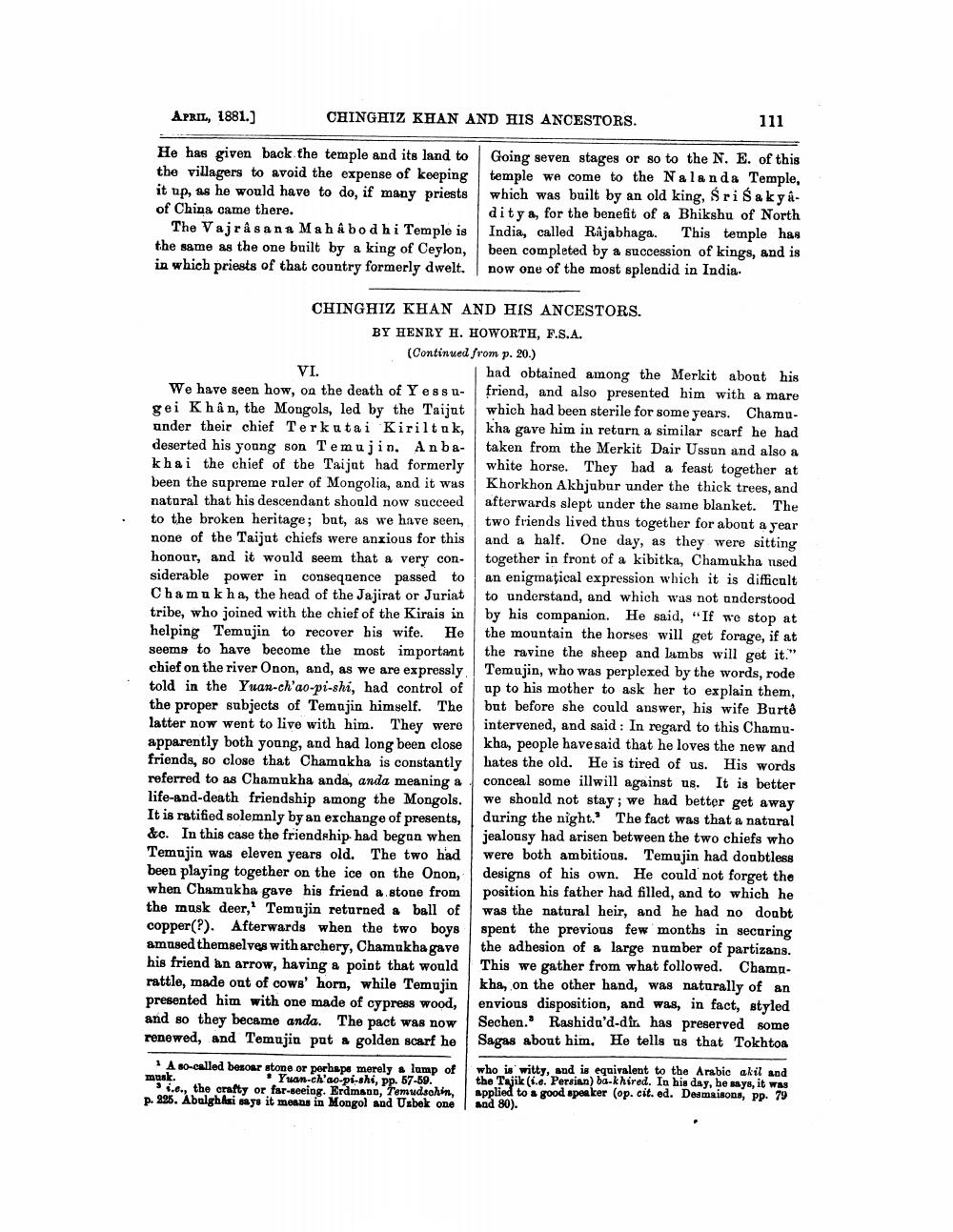________________
APRIL, 1881.]
CHINGHIZ KHAN AND HIS ANCESTORS.
111
He has given back the temple and its land to the villagers to avoid the expense of keeping it up, as he would have to do, if many priests of China came there.
The Vajra sana Mah & bodhi Temple is the same as the one built by a king of Ceylon, in which priests of that country formerly dwelt.
Going seven stages or so to the N. E. of this temple we come to the Nalanda Temple, which was built by an old king, Sri Sakyaditya, for the benefit of a Bhikshu of North India, called Rajabhaga. This temple has been completed by a succession of kings, and is now one of the most splendid in India.
CHINGHIZ KHAN AND HIS ANCESTORS.
BY HENRY H. HOWORTH, F.S.A.
(Continued from p. 20.) VI.
had obtained among the Merkit about his We have seen how, on the death of Yessu- friend, and also presented him with a mare gei Khân, the Mongols, led by the Taijut which had been sterile for some years. Chamuunder their chief Terkutai Kiriltak, kha gave him in return a similar scarf he had deserted his young son Temujin. Anba- taken from the Merkit Dair Ussun and also a khai the chief of the Taijut had formerly white horse. They had a feast together at been the supreme ruler of Mongolia, and it was Khorkhon Akhjubur under the thick trees, and natural that his descendant should now succeed afterwards slept under the same blanket. The to the broken heritage; but, as we have seen, two friends lived thus together for abont a year none of the Taijut chiefs were anxious for this and a half. One day, as they were sitting honour, and it would seem that a very con- together in front of a kibitka, Chamukha nsed siderable power in consequence passed to an enigmatical expression which it is difficult Chamu kha, the head of the Jajirat or Juriat to understand, and which was not understood tribe, who joined with the chief of the Kirais in by his companion. He said, "If we stop at helping Temujin to recover his wife. He the mountain the horses will get forage, if at seems to have become the most important the ravine the sheep and lambs will get it." chief on the river Onon, and, as we are expressly. Temujin, who was perplexed by the words, rode told in the Yuan-ch'ao-pi-shi, had control of ap to his mother to ask her to explain them, the proper subjects of Temujin himself. The but before she could answer, his wife Burto latter now went to live with him. They were intervened, and said : In regard to this Chamuapparently both young, and had long been close kha, people have said that he loves the new and friends, so close that Chamukha is constantly hates the old. He is tired of us. His words referred to as Chamukha anda, anda meaning a conceal some illwill against us. It is better life-and-death friendship among the Mongols. we should not stay; we had better get away It is ratified solemnly by an exchange of presents, during the night. The fact was that a natural &c. In this case the friendship had began when jealousy had arisen between the two chiefs who Temujin was eleven years old. The two had were both ambitious. Temujin had doubtless been playing together on the ice on the Onon, designs of his own. He could not forget the when Chamukha gave his friend a stone from position his father had filled, and to which he the musk deer, Temujin returned a ball of was the natural heir, and he had no doubt copper(?). Afterwards when the two boys spent the previous few months in securing amused themselves with archery, Chamukha gave the adhesion of a large number of partizans. his friend an arrow, having a point that would This we gather from what followed. Chamgrattle, made out of cows' horn, while Temujin kha, on the other hand, was naturally of an presented him with one made of cypress wood, envious disposition, and was, in fact, styled and so they became anda. The pact was now Sechen.' Rashida'd-dir has preserved some renewed, and Temujin put golden scarf he Sagas about him. He tells us that Tokhtoa
A so-called besoerstone or perhaps merely a lump of musk.
* Yuan-ch'ao-pi-shi, pp. 57-59. 91.c., the crafty or far-seeing. Erdmann, Temudsohin, p. 995. Abulghi says it means in Mongol and Usbek one
who is witty, and is equivalent to the Arabic akil and the Tajik (i... Persian) ba-khired. In his day, be says, it was applied to a good speaker (op. cit. ed. Desmaisons, pp. 79 and 80).




